Probably, many faced such a problem that the magazines for cutting and sewing are full of a variety of patterns of everyday and business outfits, and there are very few evening models. As a rule, they are boring and do not always follow fashion trends. On this occasion, a selection of patterns for evening dresses from the catwalk from world couturiers has been created for you. Sexy mermaid dress, A-line silhouette with a deep neckline, classic straight and disco short - these dresses will always be relevant.
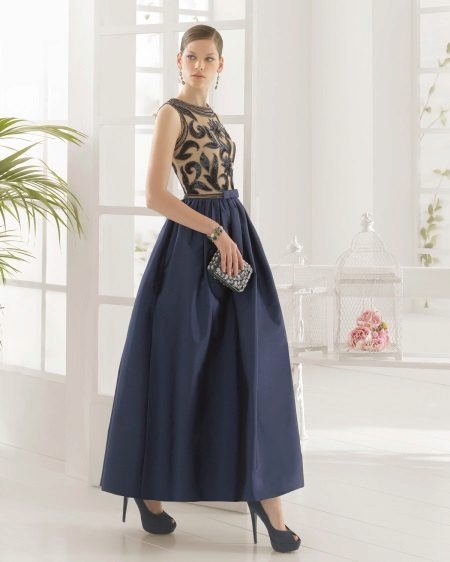
Mermaid
We can say that the mermaid is the most interesting style for designers. The tight-fitting silhouette and flared skirt remain unchanged, but what the bodice and “tail” will be depends on the imagination.
We bring to your attention a simple model on the straps and with light drapery on the bodice, which will give a small volume of the chest and focus on the neckline, a wide belt will additionally contribute to this.
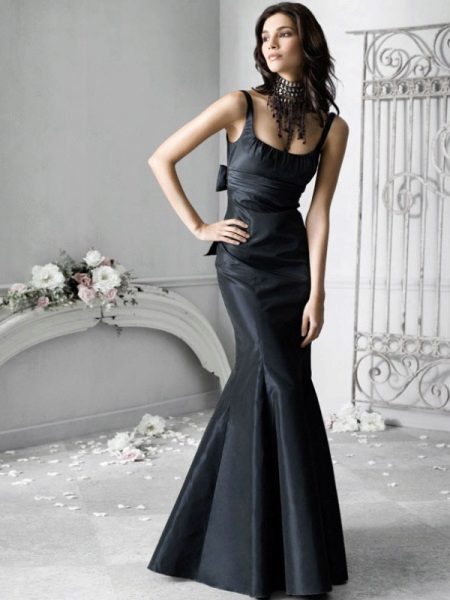
Modeling Transmission
- Add on the base pattern the length of the skirt you need and flare it. The splendor of the “tail” depends on the width of the flare.
- Draw a neckline and armholes. Close the tuck.
- The bodice is cut-off, so put it down from the neck 15-16 cm and simulate a belt 8-9 cm high (see pattern).
- The belt is ready, we will cut it off.
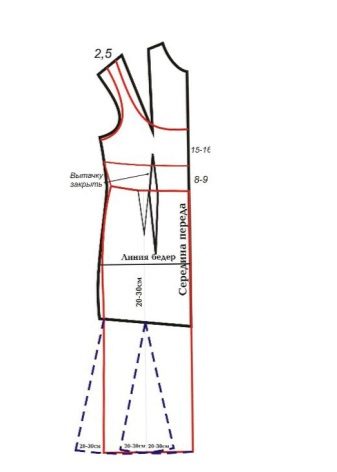
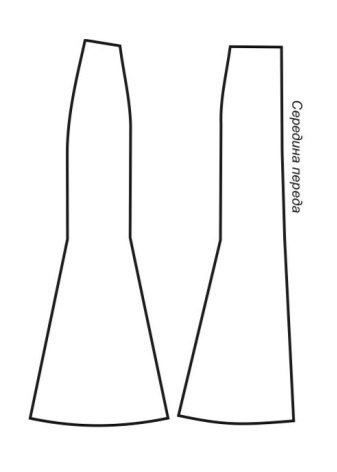
Bodice modeling
Before the bodice, cut along the lines and expand by two cm (see figure). The distance between the parts can be increased to 3 cm, if you want the number of assemblies to be large.
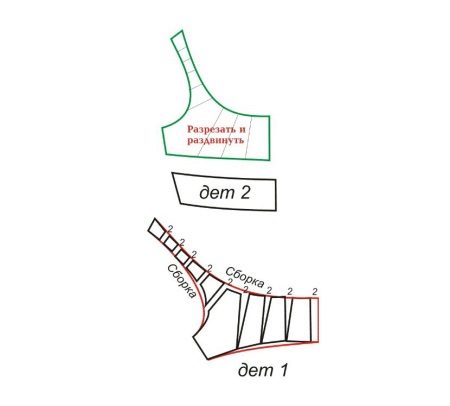
Back modeling
Similar to the front of the dress, simulate the back.
This outfit should strongly fit the silhouette, which means that the increase in freedom of fit is made minimal.
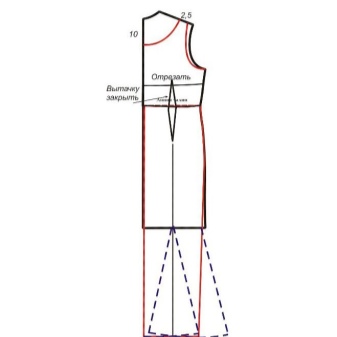
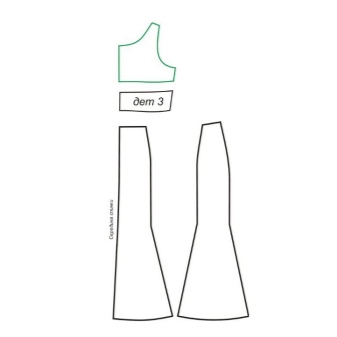
Belt and bow decoration
- To drape the belt, you need a rectangle with a width equal to the width of the front part of the belt (det 2). Its height is 2 times greater.
- Sew the rectangle on the sides, gently pull it evenly to the width of the front belt. Sweep them together and grind. Then spot the drapery on the upper and lower cuts. Sew further as a single layer part.
- For the bow, also cut out two rectangles. Their width in finished form should equal the width of the front part of the belt, and the length - 75 cm.
- Stitch all the details of the dress. Sew the finished bow elements in the sides of the mermaid and tie on the bow.
Haute Couture Floor
Elie Saab at one of the shows presented a red chiffon dress with the illusion of nakedness.
The cut of the model is quite complicated, so we will examine in detail the stages of sewing.
For work are necessary:
- lining fabric to match skin tone;
- Chantilly lace;
- chiffon:
- lightning.
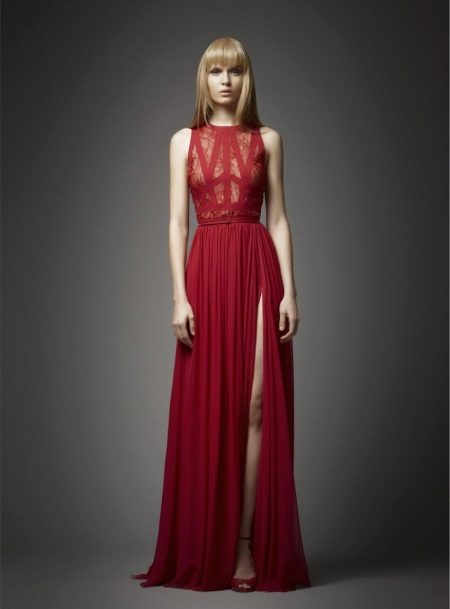
Building patterns
Please note that you can create a pattern of an evening dress with your own hands in 2 options:
- draw on graph paper, and then cut;
- use the RedCafe program.
The program has a convenient function that separates the lines by color, so you can see the location of all the lines.
Note that simulating a skirt is quite simple and you can immediately do it on fabric.
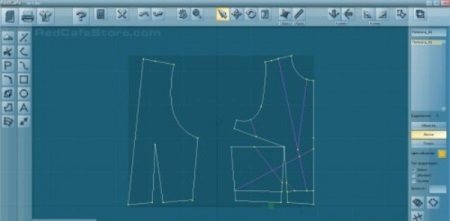
Lining
The modeling stage is completed, we proceed to work with the fabric.
- Print the pattern and fold it into a single unit, combining the corners.
- Then transfer the pattern to the lining fabric and circle the lines with soap or a piece of chalk. You can use the disappearing marker.
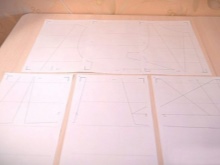
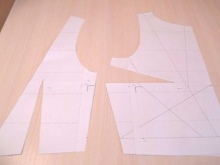
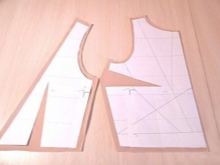
Sew tucks and side seams on a typewriter without fastening and a large stitch width. Such a sweeping is necessary to check the necessary landing of the bodice on the mannequin.
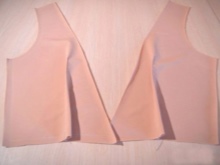
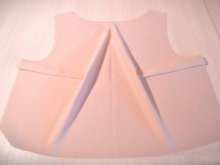
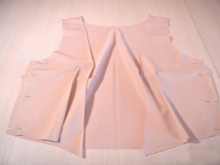
Since the model is difficult to sew, more often check the fit on the figure. So you will achieve the desired results more successfully.
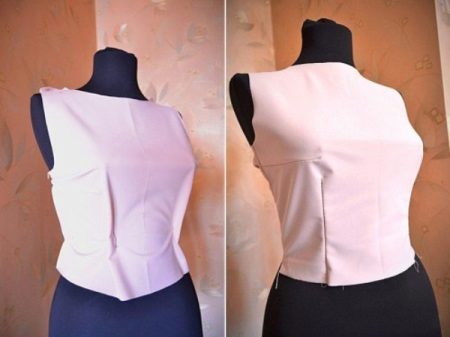
Work with lace
Lace fabric over the patterns of the lining fabric. Fix it on the sides and grind the tucks, having previously cut off the excess lace along all the sections.
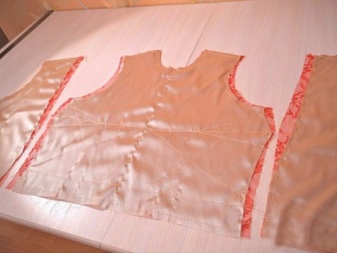
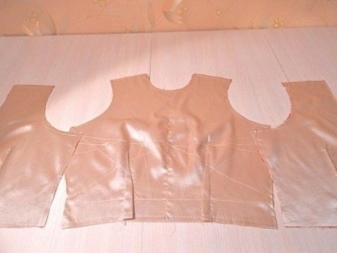
Stitch the tucks at the waist and press them to the center. Make sure that they are not visible on the lace on the front side.
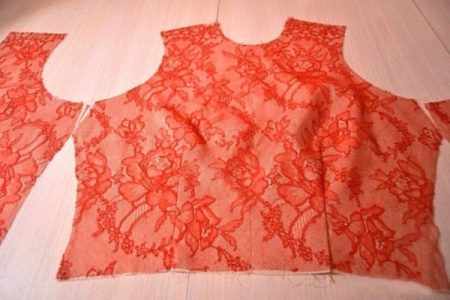
Stitching embossed lines
At this stage, the process of sharpening the embossed inlay is important. The pattern should be beautiful, without overlays of lines. And to understand which line will be the first, make a sample. For contour lines, take an oblique trim from knitwear. It is gloss-free and easy to operate.
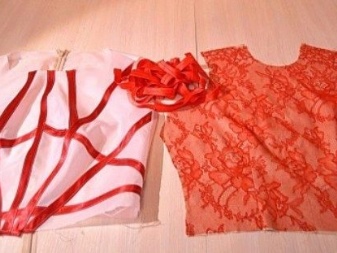
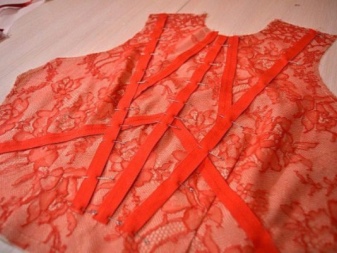
Slicing
Use a knit hem to cut sections of the armhole and neck. The neck, turning into a cut on the back, is treated with an inlay sewn in a U-turn.
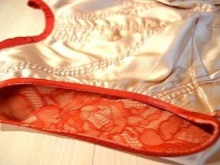
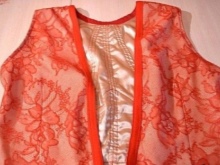
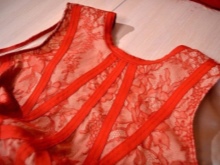
Open skirts
The half-skirt consists of a dense lining and transparent chiffon.
First, you need to calculate the radius of the waist (From). The radius formula will help you with this: R = (Otkh2) / (2kh3,14).
Make the lower radius the desired width.
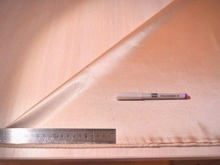
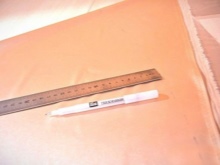
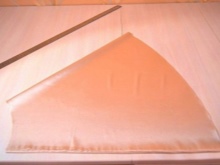
Work with large cuts has its own characteristics:
- Make sure that there are no defects, stains, stitches on the fabric;
- Try to buy material in stock, so you do not overpay.
- Keep in mind that chiffon with natural threads can shrink, so do a wet-heat treatment on a sample of material.
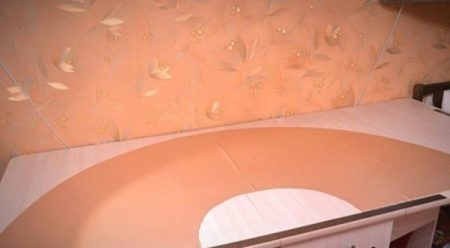
Get rid of the edge. After making an incision, tear it along the lower and upper edges of the fabric.
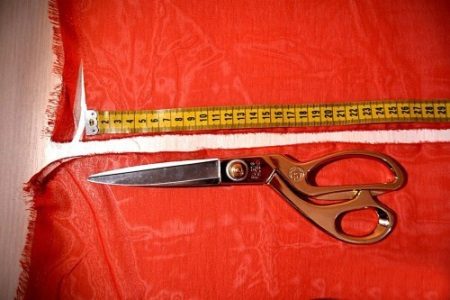
To assemble the skirt along the waist line, lay 2 lines 1 cm apart and carefully pull to the desired width. Threads are better to take reinforced, they are resistant to strong tension.
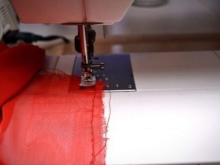
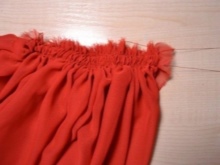
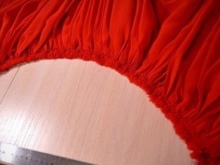
Sew a lined chiffon skirt. Process the slices on the overlock. Attach the bottom to the bodice of the dress on the mannequin. Correct inaccuracies if necessary.
Next, open the belt. Its width in finished form should be 3 cm.
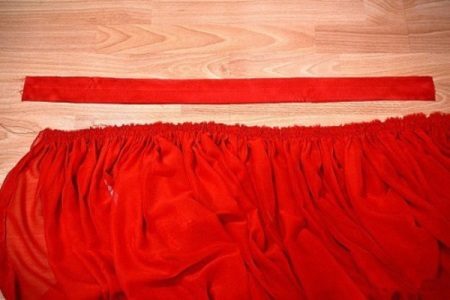
Stitch the zipper into the middle seam on the skirt.
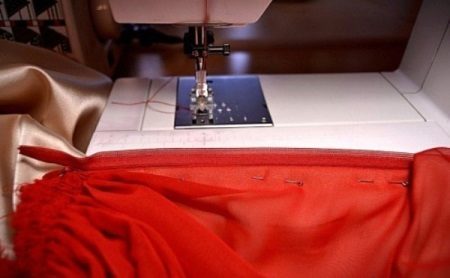
At the final stage, connect all the parts. Stitch the belt to the skirt with frills on the bottom edge, and then to the top of the dress.
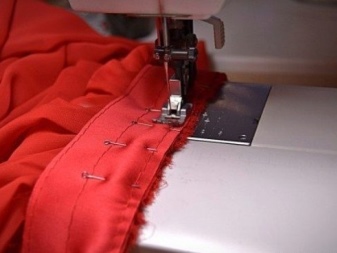
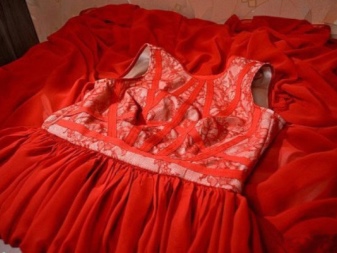
Short dress with one sleeve
The evening option on one shoulder allows not only to move away from the usual styles, it has a number of advantages, for example practicality. The dress pattern will be relevant for any occasion. The solemnity of the model will depend on the selected material, while the length can be adjusted to your liking.

Modeling
- On a base pattern, cut the chest and shoulder tucks.
- Shoulder sections combine.
- Tucks close and fill the neck.
- Model the back.
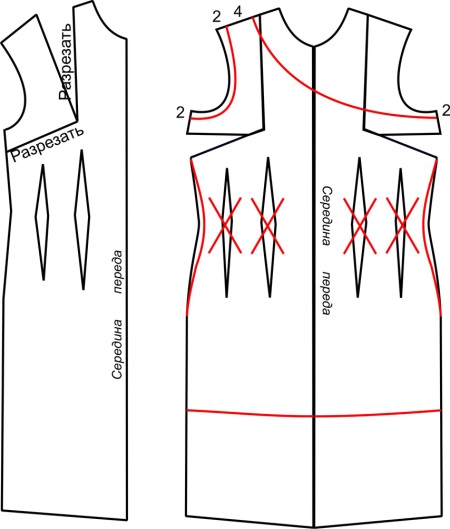
The increase in freedom of fitting depends on the fabric you have chosen. If it is elastic, then the increase is minimal - 1.5 cm. Be sure to completely re-back the back when modeling and before dressing on tracing paper.
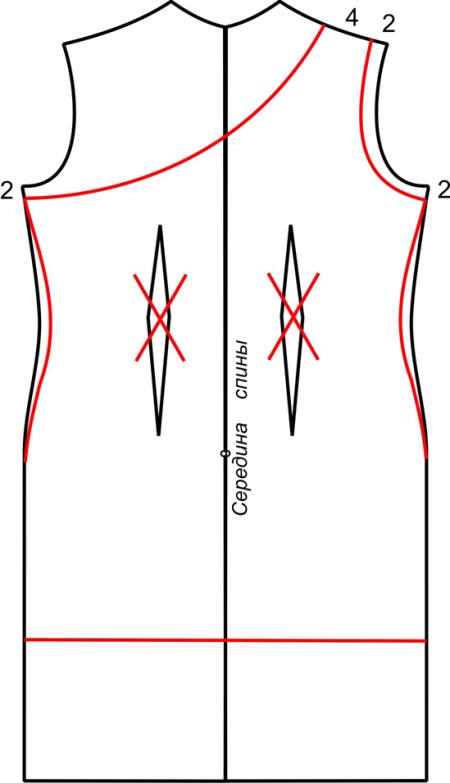
Model a tight-fitting sleeve and shuttlecock.
When cutting parts, lay the fabric in one layer. Exceptions are shuttlecocks, where the details for the back and front should be the same.
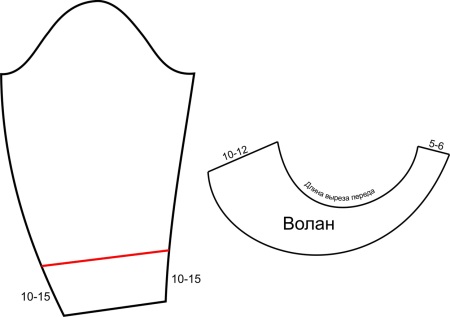
With a deep neckline
Another versatile and practical with a number of advantages is an A-line evening dress. It should be an integral part of the wardrobe, especially such a spectacular red dress, like Kim Kardashian.
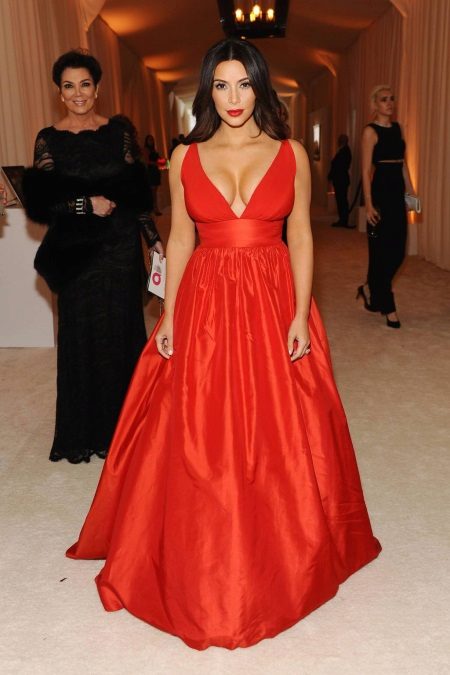
Bodice modeling
Armed with the basic foundation of a dress that suits your size, we proceed to modeling. The model consists of 2 parts, so the top and bottom will be modeled separately.
First you need to make a belt. On the back and front sections, set aside 7 cm, then connect the points with a line. Cut off the belt with the skirt.
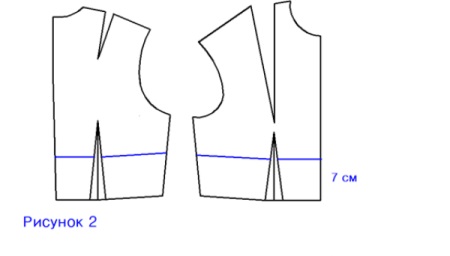
It turned out the back and 2 shelves. Now move the shoulder tucks down
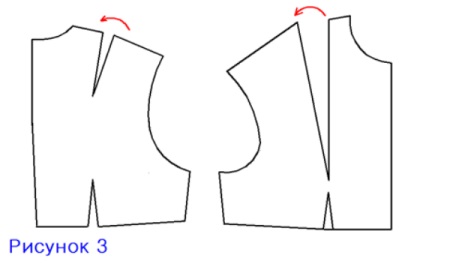
Straps make 2-2.5 cm wide. 4 cm were added along the bottom of the bodice, since the tucks are translated. Fold them.
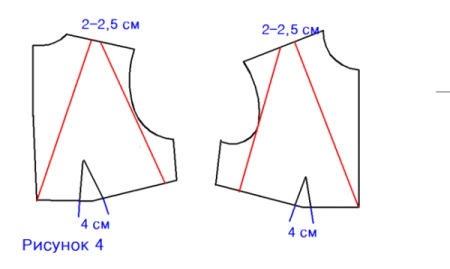
Belt modeling
The width of the belt should be 7 cm. And the length is determined by the formula:
- for the upper cut - 2x + 2 y, that is, the length of each part of the bodice along the lower cut is added up. Do not forget to add padding in the area of the side seams.
- for the lower cut - a + b, the length of which is equal to the circumference of the waist.
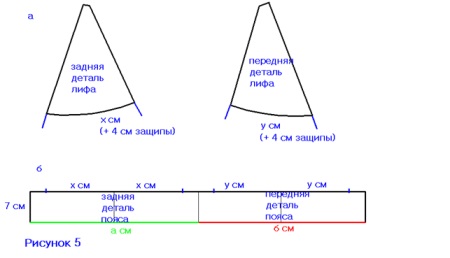
Skirt modeling
- Remove the tucks at the waist.
- Make a breeding on the skirt. You should draw cut lines (they are shown in red in the figure) on both panels of the skirt.
- Spread the resulting items to the desired size.
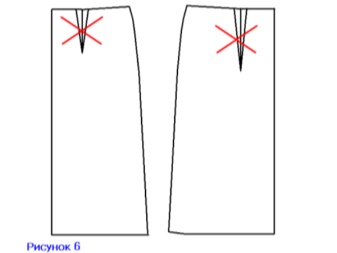
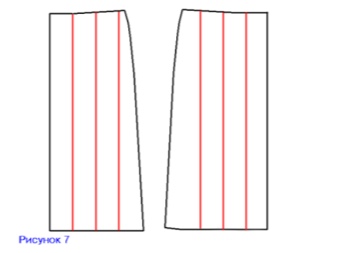
On the upper cut of the skirt's grinding to the belt, you need to specify the assembly. To do this, make a breeding along the waistline of 8 cm.
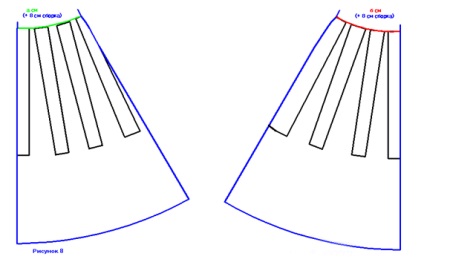
Modeling the skirt ends with the design of the waist and sections of the skirt in a smooth line. Also set the desired length.
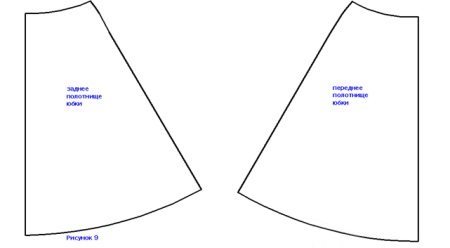
Cut
It's time to put down the pencil and cut out the details. Open 2 parts, 1 belt and 1 panel for the skirt for the bodice.
If the fabric is not dense and the bodice shows through, then make it two-layer.
Do not forget about allowances - 1 cm and hem hem. Sew the hidden zipper into the side slice.












Thanks for the patterns! Saved myself, I will create)